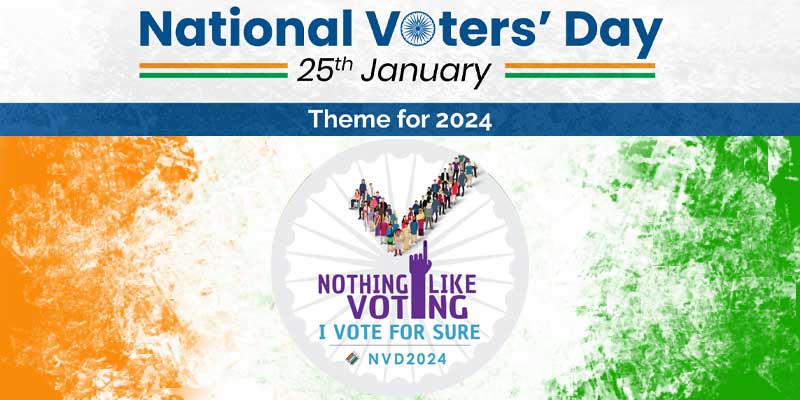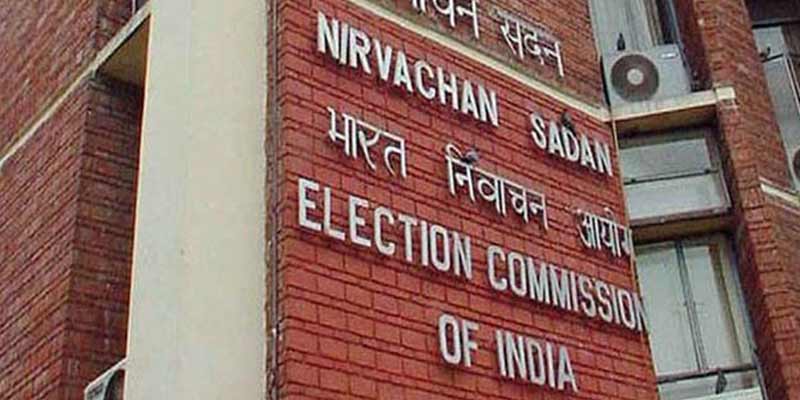- India
- Jan 25
Govt celebrates National Voters’ Day
• During the 14th National Voters’ Day celebrations in New Delhi on January 25, President Droupadi Murmu presented the Best Electoral Practices Awards for the year 2023 to the state and district level officers for their outstanding performance in the conduct of elections during 2023.
• Awards were also presented to important stakeholders including government departments, and media organisations for their valuable contribution towards voters’ awareness.
• The National Voters’ Day (NVD) has been celebrated in India on January 25 every year since 2011 to commemorate the establishment of the Election Commission in 1950.
• The main purpose of the NVD celebration is to encourage, facilitate and maximise the enrollment, especially for the new voters. The Day focuses on spreading awareness among voters for promoting informed participation in the electoral process.
• This year, the theme is ‘Nothing Like Voting, I Vote For Sure’.
• NVD is celebrated at the national, state, district, constituency and polling booth levels, which makes it one of the largest celebrations in the country.
Election Commission of India
• The Election Commission of India (EC) is a permanent independent constitutional body created under Article 324 of the Indian Constitution.
• The EC was set up on January 25, 1950, on the eve of India becoming a sovereign democratic republic with its headquarters in New Delhi.
• The first Chief Election Commissioner (Sukumar Sen) was appointed on March 21, 1950.
Functions of EC
• EC is vested with the powers and responsibilities of superintendence, direction and control of the entire process of preparation and revision of electoral rolls for, and conduct of, elections to the houses of Parliament and Legislatures of the states and the Union Territories and of elections to the offices of President and Vice-President.
• It prepares, maintains and periodically updates (new registration, modification and deletion as per guidelines) the electoral rolls, registers political parties/candidates, supervises the whole process of conducting election, monitors the election campaigns, including funding and expenditure of candidates, maintaining Model Code of Conduct (MCC) to make the entire electoral process free fair democratic and accessible for all its stakeholders.
• It also facilitates coverage of the election process by the media, carries out the voter education and awareness measures, organises the polling stations/ booths where voting takes place, and oversees under stringent surveillance mechanisms the counting of votes and the declaration of results.
• EC has introduced polling through EVMs (Electronic Voting Machines) and recently, introduced VVPAT (Voter Verifiable Paper Audit Trail) with an intention to enhance transparency and credibility of all the stakeholders in the electoral process.
• The poll panel has provided for compulsory identification at the time of voting by means of Electors’ Photo Identity Cards (EPICs) and distribution of Photo Voter Slips to all electors close to polls.
• Elections are conducted according to the constitutional provisions, supplemented by laws made by Parliament and rules and orders made thereunder. The major laws are:
i) The Presidential and Vice-Presidential Elections Act, 1952.
ii) The Representation of the People Act, 1950.
iii) The Representation of the People Act, 1951.
• All political parties are required to get themselves registered with the Election Commission. Based on performance criteria laid down in the Election Symbols (Reservation & Allotment) Order 1968, the EC grants recognition to political parties as national or state parties. It also decides disputes relating to splits/mergers of recognised political parties.
• The task force for conducting a countrywide general election at over one million polling stations consists of nearly 11 million civilian and security personnel. During the election period, a vast number of additional officers and staff are temporarily drafted who all work subject to supervision, direction, control and discipline of the Commission. They function mainly as polling and counting officials.
Manorama Yearbook app is now available on Google Play Store and iOS App Store


